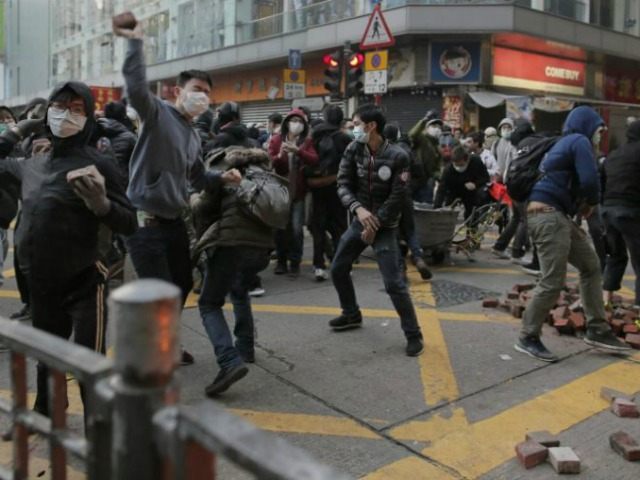Riots have sprung in the Mong Kok district of Hong Kong, injuring at least 91 people and leading to 61 arrests, according to the BBC. China’s state-run Xinhua news agency claims nearly 90 police officers have been injured, in addition to an untold number of protesters.
The incident has become known as the “Fishball Riot” or “Fishball Revolution” because the cause of the unrest was a government crackdown on unlicensed food vendors, which proliferate during the Chinese Lunar New Year celebration. #Fishballrevolution became a lively hashtag on Twitter, which is not blocked by the government in Hong Kong as it is in mainland China.
“Traditionally, authorities have turned a blind eye to unlicensed food stalls during the festive period, but authorities took a stronger line against them this year, fencing off areas which had previously been used by the hawkers,” CNN reports.
“Dozens of protesters hurled bricks and bottles at police, who responded with pepper spray and batons. Police also reportedly fired two warning shots during the clashes,” adds CNN, noting that some of the injured police officers suffered “broken bones and head wounds” from those thrown bricks.
Unsurprisingly, Xinhua paints a very dark portrait of the riots:
While occupying main streets in Mong Kok, the rioters destroyed several police vehicles and public properties, and also committed arson at a number of locations early in the morning. Many police officers were beaten to bleed in the head and face by the rioters, and several journalists were also attacked by the rioters even though they showed their identity cards.
Xinhua goes on to cite Hong Kong police commissioner Lo Wai Chung’s suggestion that the riot might have been “prepared and organized” and his claim that his department’s investigations revealed “some of the participants were transported with vehicles for use by radicals.”
A report from Vice News proposes one possible candidate for organized influence on the riot:
Hours after the unrest began, Hong Kong Indigenous, a radical localist political group, announced on Facebook that Edward Leung Tin-kei, their candidate for the upcoming Legislative Council by-elections, would be marching in the Mong Kok night market, and called on supporters to join. The post urged people who planned to join the march to bring eye masks, face masks, and protective gear. Tin-kei was arrested at around 2am.
More sympathetic voices portray the Fishball Revolution as popular anger boiling to the surface, with a heavy-handed government crackdown on popular street vendors as the spark that touched off an explosion.
“Let me make it clear to begin with I do not approve of what happened in Mong Kok on Monday night,” wrote Hong Kong resident Peter den Hartog at the South China Morning Post on Wednesday. “But at the same time let me state that I think it was bound to happen.”
“Many scholars, journalists, social workers, politicians,teachers, young activists and columnists have repeatedly stated that a government that does not listen to the people it represents is going nowhere,” Hartog continued. “Unfortunately they were proved right on Monday night. It is very simple. If you feel that you are not included in a society, you start to resent this society.”
He went on to list a number of areas in which Hong Kong locals feel their needs are being ignored, while various “white elephant projects” are pushed to the top of the agenda by Beijing.
At the Hong Kong Free Press, Jason Y. Ng compared the situation in Hong Kong with the Arab Spring, portraying the crackdown on fishball vendors as a galvanizing event like the suicide of Tunisian street vendor Mohamed Bouazizi in 2010.
Ng said the lesson for the government of Hong Kong should be clear: “Never underestimate what the little guy can do.” He notes that street vendors complain about the police expending great energy on shutting down their operations, while far more serious problems are left to fester, and government officials have no good answer to that question.
“This so-called ‘Fish Ball Revolution’ really isn’t about fish balls at all,” Ng states, concluding:
It is about citizens fed up with the daily abuse by an unelected and unaccountable government led by an unelected and unaccountable chief executive. One commentator compares Hong Kong people to a battered woman, who, after putting up with years of domestic violence, finally snapped and threw a beer bottle at her husband.

COMMENTS
Please let us know if you're having issues with commenting.